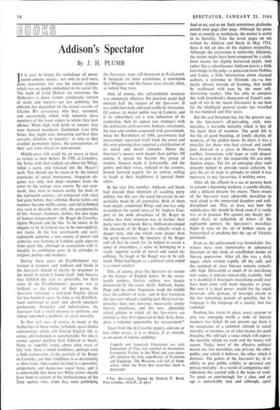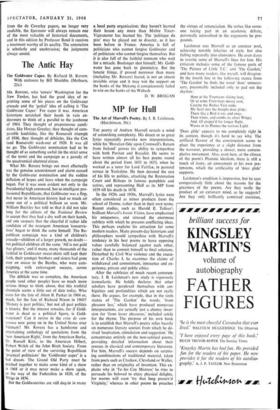Addison's Spectator
By J. H. PLUMB
IT is easy to forget the turbulence of seven- teenth-century society : not only its civil wars, plots, executions, but also the casual violence which was so deeply embedded in its social life. The duels of Lord Mohun are notorious, the Mohawks—a more violent aristocratic version of mods and rockers—get less publicity, but oblivion has descended on the casual assaults of Charles II's aristocracy who beat, wounded, and occasionally killed, with impunity those members of the lower orders to whom they took offence. When high with drink or temper, they were licensed murderers. Gentlemen were little better, they might kick, horsewhip and beat their servants, children, or tenantry : so long as they avoided permanent injury, the consequences of their acts were trivial or non-existent.
Middle-class folk could be, en masse at least, as violent as their betters. In 1705, at Coventry, the Tories with their cudgels set about the Whigs, felled a score, and knocked out the Mayor's teeth. Nor should one be taken in by the formal courtesies of social intercourse. Augustan ele- gance was only skin deep—manners from the court to the cottage were coarse. By our stan- dards, they were to remain earthy for most of the eighteenth century, yet compared with what had gone before, they softened. Rustic habits and manners became mildly comic, and old-fashioned was used to describe not only the paraphernalia of life—houses, furniture, clothes, but also types of human temperament—Sir Roger de Coverley, Squire Western and the like. To be smart, to be elegant, to be in fashion was to be metropolitan, not rustic. In the late seventeenth and early eighteenth centuries a new society of power and authority was forming in London, quite separate from court life, although in association with it. Steadily its confidence grew in its attitudes to religion, politics and manners.
During these years an Establishment was formed in London, and Addison and 'Steele in the Spectator helped to clarify its responses to the world in which it found itself. And because they fulfilled this task so admirably, for their sense of the Establishment's persona was as brilliant as the clarity of their prose, the Spectator remained a well-read English classic for two hundred years. So long as the Establish- ment continued to grow and absorb emergent professions, financiers and industrialists, the Spectator had a social purpose to perform, and indeed remained a textbook of social morality.
Its first task was, of course, to mock at the barbarities of those rustic, turbulent, quasi-feudal relationships which still littered English life as comic, old-fashioned or reprehensible. No one is sterner against duelling than Addison or Steele. None so superbly ironic about antic ways of life; true, there is much kindliness, perhaps even a little compassion, in the portrait of Sir Roger de Coverley, yet their kindliness is as devastating as their irony. One cannot be kind to a powerful, antipathetic and dangerous social force, and it is remarkable that these two Whig writers should have been so certain of the ineffectiveness of the Tory squires who, when they were publishing the Spectator, were still dominant in Parliament. It bespeaks an inner confidence, a conviction that Whiggery and the future were already allies, as indeed they were.
And, of course, this self-confident mockery was immensely effective. No previous paper had enjoyed half the success of the Spectator. It was published daily and read avidly by thousands. Of course, its major public was in London, and if its subscribers are a true indication of its readership, then its appeal was strongest with the politicians, civil servants, bankers, merchants, the men and women associated with government. Since the Revolution of 1688, government had increasingly separated itself from the court and this ever-growing class required a clarification of its social and moral attitudes. Hence the Spectator's success went deeper than politics. Of course, it spread far beyond this group of readers. Success made it fashionable, and the gentry and their wives, isolated in the country, looked forward eagerly for its arrival, willing to laugh at their neighbours if ignored them- selves.
In the very first number, Addison and Steele had stressed their intention of avoiding party politics, but this was the usual lip-service to im- partiality made by all journalists. Both of them were deeply committed Whigs and one has only to compare the sound sense of Sir Andrew Free- port to the mild absurdities of Sir Roger to realise that their intention was to further their party views by ridicule. But as Addison developed the character of Sir Roger, his ridicule struck a deeper note, and one which went deeper than the party necessities. By mockery of Sir Roger and all that he stood for, he helped to create a sense of inwardness, a sense of belonging to a vastly superior world of moral and social ex- cellence. To laugh at Sir Roger was to be cul- tured. What had begun as a political satire ended as a social catalyst.
This, of course, gives the Spectator its stature in the history of English letters. In the seven- teenth century, literary culture was largely dominated by the court. Swift, Addison, Steele, Pope and the other Augustans made the middle class the arbiters of taste: and in that transition the Spectator played a leading part. Historical im- portance does not, however, necessarily confer literary excellence, and this new, splendidly edited edition in which all the Spectators are printed as they first appeared in their daily dress, gives a welcome opportunity for reassessment.* Apart from the de Coverley papers, and one or two other essays, it is as dreary, if as smooth, as an ocean of tapioca pudding:
Foppish and fantastick Ornaments are only Indications of Vice, not criminal in themselves. Extinguish Variety in the Mind and you natur- ally retrench the little superfluities of Garniture and Equipage. The Blossoms will fall of them- selves, when the Root that nourishes them is destroyed.
THE SPECTATOR. Edited by Donald F. Bond. Five volumes. (O.U.P., 21 gns.) And so on, and so on. Such sententious platitudes stretch over page after page. Although the prose runs as sweetly as toothpaste, the matter is awful in its banality. Take the seven pages on wit written by Addison and Steele in May 1711; there is not an idea of the slightest originality. Although the expression is uniformly felicitous, the matter might have been composed by a sixth- form master for slightly backward pupils. And rather like a schoolmaster Addison inserts a little knowledge in the pulp—a quotation from Hobbes and Locke, a little information about classical authors, a reference to Aristotle, etc.—a few neatly chosen morsels of learning, that could be swallowed with ease by the most self- distrusting readers. One has only to compare this with Gombrich's discussion of Freud's con- cept of wit in the recent Encounter to see how far the intelligent general reader has travelled in two hundred and fifty years.
But the real boredom lies, for the present age, in the Spectator's all-pervading, arch, cosy morality, a tea-table morality which is less of the heart than of manners. The good life is the life of good breeding, of kindly charity, of modesty, of the golden mean. In short, it was a morality for those who had arrived and could look forward to a place in Heaven. Passion, conflict, frustration, wild hope or wild despair have no part in it: the respectable life can only deplore excess. Yet for an emerging class such precepts helped to provide social cohesion, to give the air of truth to attitudes to which it was necessary to pay lip-service, if nothing more.
After all, the affluent in a sea of poverty have to present a becoming modesty, a seemly charity, and a delicate distaste for excess. These essays of the Spectator were admirable moralities to read aloud to the unmarried daughter and well- disciplined son. This, at least, was how the middle-class life should be lived, even if it rarely was so in practice. Put against any deeply per- sonal diary or collection of letters of the eighteenth century the Spectator's moralities begin to take on the air of hollow sham, as hypocritical as anything that the age of Victoria produced.
Even so, the achievement was formidable; few writers have won immortality in ephemeral literature of this kind, or established modes of literary expression. After all, this was a daily paper, often written rapidly off the cuff, and the standard of sheer literacy remains remark- ably high. Distasteful as much of its moralising now seems, it remains remarkably readable. And it is doubtful if bourgeois moralising could ever have been done with more elegance or grace. But now it is dead prose: useful for the social historian; still, perhaps, of nostalgic charm to the few remaining pockets of gentility, but its language is the language of a society that has vanished.
Nothing has taken its place, every attempt to give our emerging world a code of literary manners has failed. In our present age there is no acceptance of a common attitude to social morality or manners, or of what makes for good breeding. We still lack a voice which will express the morality which we want and the future will accept. Today most of the effective political nation has two moralities, one private, the other public; one which it believes, the other which it distrusts. The genius of the Spectator lay in its ability to give public validity to personal and private morality : in a world of competitive indi- vidualism this carried with it the force of truth. To speak so convincingly for a class and an age is remarkably rare and although, apart from the de Coverley papers, no longer very readable, the Spectator will always remain one of the most valuable of historical documents, and in this edition by Professor Bond it receives a treatment worthy of its quality. The annotation is scholarly and unobtrusive; the judgments always sound.



































 Previous page
Previous page